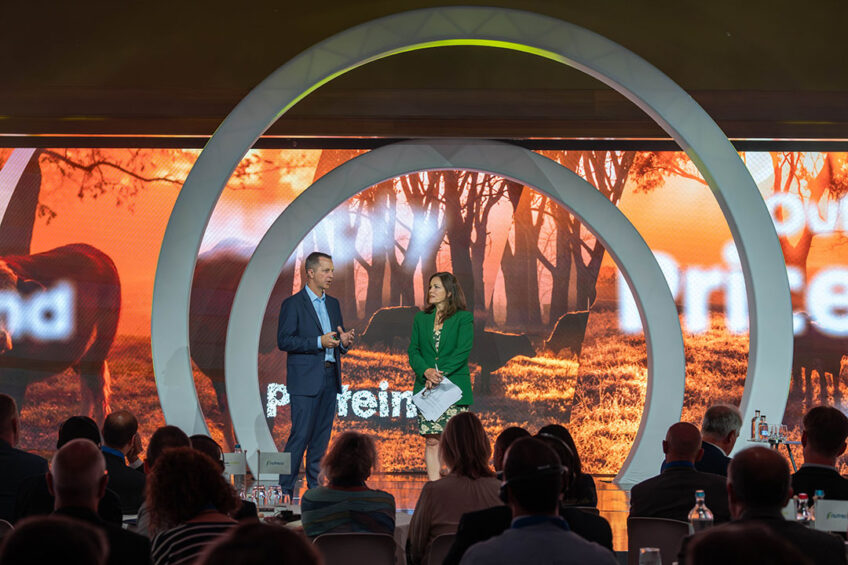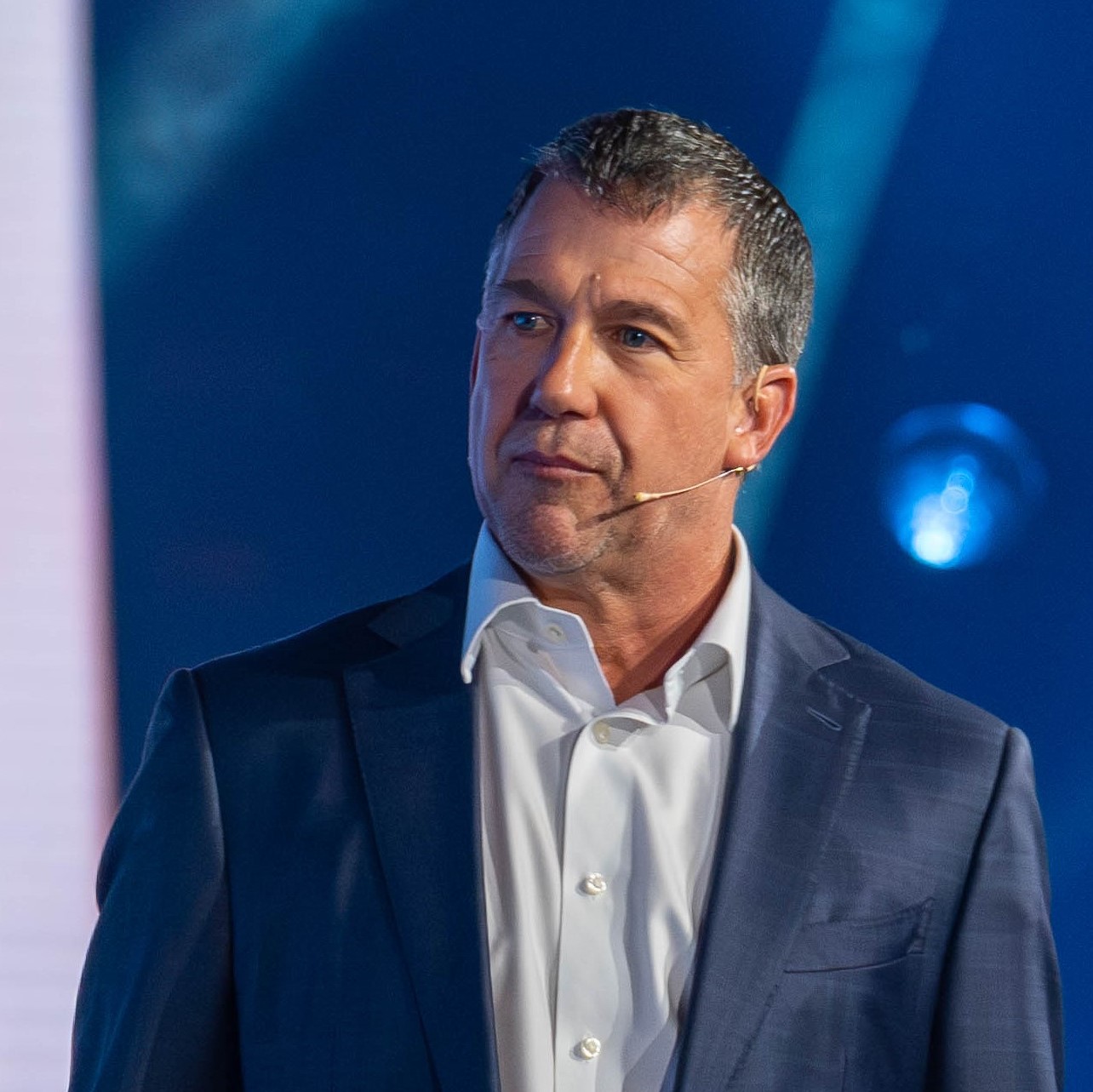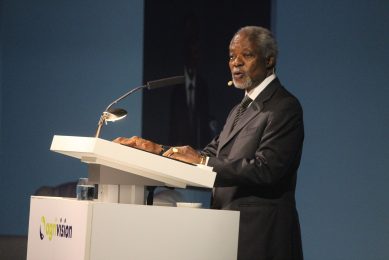AgriVision 2023: Future proofing proteins

AgriVision 2023 took place on 26-28 June, in Noordwijk-aan-Zee, the Netherlands. The biennial event brought together over 300 participants from 42 different countries. The theme of this year’s event was the “Path to future-proof proteins,” how to meet today’s growing demand for protein without diminishing the capacity to meet tomorrow’s needs.
The 2-day event was the ideal platform for key agriculture and food industry players to share their thoughts, research and opinions. It included many interactive moments with the audience. The presentations covered topics from the global trends in agriculture to using insects as an alternative and sustainable protein source.

Tackling challenges together
David Blakemore, CEO of Trouw Nutrition and COO Livestock Feed at Nutreco, set the scene in his opening speech by saying that “AgriVision has been a great opportunity for us all to come together and discuss the challenges and opportunities that face our industry, we can all agree that there is plenty of both at the moment. By working together, we can tackle these challenges.”
He said he has a lot of passion for the industry and believes what we do in the industry matters to people and the planet. “The things we do in the next few years will set the stage and have a tremendous impact on the environment and human nature. There is good news, as we all share a common goal to really develop a sustainable animal protein industry, a sustainable industry that will provide future generations with healthy food and leave a healthy planet for them. Within the room we have the expertise, the capabilities and the strength and the desire to really make a difference in what we do.”
Building sustainable business models
Next to take the stage was Paul Polman, former CEO of Unilever and also climate analyst, author, and contributor to the UN Sustainable Development Goals. His keynote speech tackled problems such as climate change, poverty and inequality. According to Polman, the Earth’s capacity to absorb waste and carbon emissions is coming to an end. He expressed his concerns about the timeframe we have to respond. “Every day we wait, the costs are going up exponentially,” he said.
Referring to the UN Sustainable Development Goals, he pointed out that since Covid-19, only 12% of the goals have been met and the world is experiencing increases in poverty, inequality, and climate change. Polman expressed how even today there are 1 billion people going without food daily. He advised when putting business models together, that they be put together with these people in mind. He concluded his presentation with some questions for the audience. One of them being, what collective actions are you taking as an industry to tackle these bigger challenges?
Adaptation is the key, you do not have to be the strongest or the smartest, but you better learn how to adapt and adjust to a changing environment
Brett Stuart, president of Global AgriTrends
Megatrends in agriculture
Brett Stuart, president of Global AgriTrends, presented his thoughts about the current and upcoming megatrends in agriculture that will greatly influence agriculture producers, as well as consumers. In his presentation he talked about 4 megatrends: world population, more money, China and livestock and agriculture policies. He asked the audience, “Is the future predictable or not?” Some trends are predictable, he went on to say, such as the growth of the world population by 2050. He delved further into data suggesting that feeding the estimated 10 billion people is possible but only if we can share technology and productivity, globally. “The future will be different; there is rising demand and at the same time there is also opposition. Adaptation is the key, you do not have to be the strongest or the smartest, but you better learn how to adapt and adjust to a changing environment,” was his concluding remark.
Livestock diseases and a retailer’s perspective
Keith Sumption is chief veterinary officer at the Food and Agriculture Organization (FAO) of the United Nations. He discussed how African Swine Fever (ASF) and other diseases are affecting the health and performance of livestock. He also covered the challenges producers are facing in the effort to produce safe and affordable protein.
With the consumer in mind, Imke van Gasselt, vice president for health and sustainable diets at retailer Ahold Delhaize, shared how the retailer is working to make healthy and sustainable choices easier for consumers and bring alternative protein products to the market. She stated, “All these challenges that we are facing today be it health or environmental, food can be part of the solution.” Her presentation also touched upon food waste, circular packaging and the de-carbonisation of the food chain.
Alternative protein sources
CEO and co-founder of InsectiPro, Talash Huijbers told an inspirational story. She gave her thoughts on what the future of sustainable proteins looks like. She created a circular business model in Kenya that puts black soldier flies and crickets to good use. InsectiPro grows black soldier flies as an alternative high-protein source for the animal feed industry and crickets for human consumption. Her presentation went into detail on how these insects can be used to make changes in the feed and food industry. For those who were feeling a little adventurous, Huijbers had bags of dried, flavoured crickets to sample.
Final thoughts
Nutreco CEO, Fulco van Lede wrapped up AgriVision 2023. He used the word “connect” to tie everything together. He explained how he thought connectivity is also important “using the data that is already available, the technology to drive productivity, to drive transparency.” He emphasised also how connecting with each other is just as important, making new connections and strengthening existing ones.
Nutreco is passionate about “Feeding the future,” he stated. Van Lede mentioned that collaboration is the key across the whole chain, because the challenges the industry faces are just too big for one company to handle. The presentations at Agri Vision 2023 validated that cooperating rather than competing is the way forward. He concluded his speech by saying, “There is tremendous potential within our industry to navigate obstacles and take actions that will be critical for the future. Let’s turn the change that is needed into an exciting opportunity.”
 Beheer
Beheer






 WP Admin
WP Admin  Bewerk bericht
Bewerk bericht